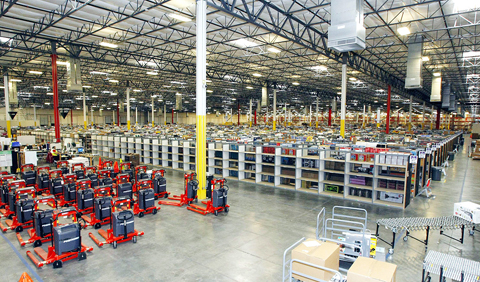Amazon.com Inc, the world’s largest Internet retailer, posted profit and sales that beat analysts’ estimates and said revenue growth may accelerate this quarter as consumers start spending more following the recession.
Net income in the fourth quarter jumped 71 percent to US$384 million, or US$0.85 a share, beating estimates. Sales also topped estimates, rising 42 percent to US$9.52 billion.
Sales could rise as much as 43 percent to US$7 billion in the first quarter, more than last year’s 18 percent, the Seattle-based company said in a statement on Thursday.

PHOTO: REUTERS
Sales from international operations, including those in the UK, Germany, Japan, France and China, rose 48 percent to US$4.56 billion, accounting for 48 percent of revenue, Amazon.com said. Global media sales, which includes books and digital music, advanced 29 percent to US$4.68 billion in the quarter. Before foreign exchange fluctuations, the growth rate was 23 percent.
The company’s growth in new categories such as patio furniture and downloadable films, TV and games has allowed it to get better deals from vendors, which helped boost profitability, chief financial officer Tom Szkutak said.
“Some of the categories we started in just a few years ago are becoming more meaningful,” he said on a conference call.
Apple Inc and Sony Corp are creating new competition for Amazon.com’s Kindle, which sells for US$259 and US$489. Apple’s iPad, which can display books, surf the Web and show video, starts at US$499. Sony introduced a touch-screen reader in August for US$299.

Quanta Computer Inc (廣達) chairman Barry Lam (林百里) is expected to share his views about the artificial intelligence (AI) industry’s prospects during his speech at the company’s 37th anniversary ceremony, as AI servers have become a new growth engine for the equipment manufacturing service provider. Lam’s speech is much anticipated, as Quanta has risen as one of the world’s major AI server suppliers. The company reported a 30 percent year-on-year growth in consolidated revenue to NT$1.41 trillion (US$43.35 billion) last year, thanks to fast-growing demand for servers, especially those with AI capabilities. The company told investors in November last year that

Taiwanese suppliers to Taiwan Semiconductor Manufacturing Co. (TSMC, 台積電) are expected to follow the contract chipmaker’s step to invest in the US, but their relocation may be seven to eight years away, Minister of Economic Affairs J.W. Kuo (郭智輝) said yesterday. When asked by opposition Chinese Nationalist Party (KMT) Legislator Niu Hsu-ting (牛煦庭) in the legislature about growing concerns that TSMC’s huge investments in the US will prompt its suppliers to follow suit, Kuo said based on the chipmaker’s current limited production volume, it is unlikely to lead its supply chain to go there for now. “Unless TSMC completes its planned six

Intel Corp has named Tasha Chuang (莊蓓瑜) to lead Intel Taiwan in a bid to reinforce relations between the company and its Taiwanese partners. The appointment of Chuang as general manager for Intel Taiwan takes effect on Thursday, the firm said in a statement yesterday. Chuang is to lead her team in Taiwan to pursue product development and sales growth in an effort to reinforce the company’s ties with its partners and clients, Intel said. Chuang was previously in charge of managing Intel’s ties with leading Taiwanese PC brand Asustek Computer Inc (華碩), which included helping Asustek strengthen its global businesses, the company

Power supply and electronic components maker Delta Electronics Inc (台達電) yesterday said second-quarter revenue is expected to surpass the first quarter, which rose 30 percent year-on-year to NT$118.92 billion (US$3.71 billion). Revenue this quarter is likely to grow, as US clients have front-loaded orders ahead of US President Donald Trump’s planned tariffs on Taiwanese goods, Delta chairman Ping Cheng (鄭平) said at an earnings conference in Taipei, referring to the 90-day pause in tariff implementation Trump announced on April 9. While situations in the third and fourth quarters remain unclear, “We will not halt our long-term deployments and do not plan to